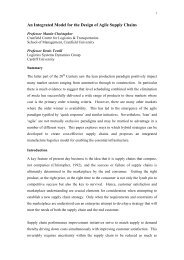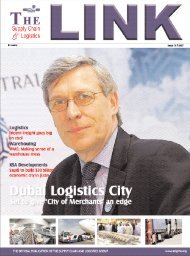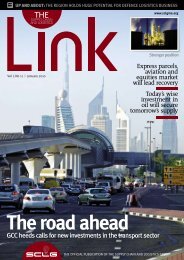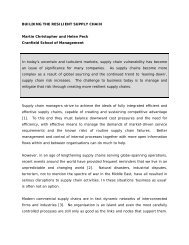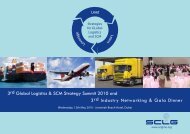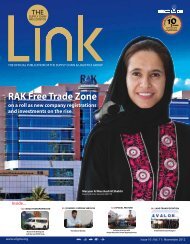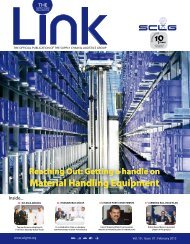Create successful ePaper yourself
Turn your PDF publications into a flip-book with our unique Google optimized e-Paper software.
Academia<br />
51<br />
Many practitioners have acquired skills based on<br />
experience. What are the advantages of having<br />
academic credentials?<br />
Academic training either reinforces the operational<br />
experience or alternatively, offers a different,<br />
perhaps more credible, alternative perspective to be<br />
applied. That is why, nowadays, most leading<br />
organisations are seeking the blend of both<br />
operational practicality and academic rigour.<br />
Operational skill sets are really the “how to” of any<br />
level of business planning, with academic rigour the<br />
“why” element of such planning.<br />
Supply chain is more apparently global now. But in<br />
the learning process, does geographic location or<br />
specific industry issues take any importance within<br />
the study process? Not really. The subject of SCM at<br />
an accredited level can only be successful if applied<br />
in a generic format i.e. without influence to location<br />
or industry. This is not to say that practices and<br />
externalities do not shape our application of learning<br />
– but they should be factors that are bought into the<br />
equation once the fundamentals have been<br />
understood. If the differences were so great across<br />
region and industry, we would have specific SCM<br />
region/industry programmes in a subject that by<br />
definition is indeed global. Local nuances and<br />
industry characteristics aside, the core elements of<br />
any facet of supply chain management learning are<br />
eminently transferable.<br />
What changes should supply chain and logistics<br />
specialists prepare themselves in the next<br />
five years?<br />
I believe there are five changes that will stand out.<br />
First, SCM will become more virtual as the<br />
prevalence of outsourcing non core activities<br />
continues and non value adding assets and functions<br />
are divested. Second, supply chains will continue to<br />
expand globally across regions and timeframes<br />
making efficient management of the entire structure<br />
that more complex.<br />
Third, there will be a shift from a requirement for<br />
functional experts to a requirement for relationship<br />
experts and fourth, IT advances will continue on<br />
their exponentially evolving path, providing the<br />
enabling capabilities to optimize the extraction to<br />
consumption breadth of supply chain management<br />
activities.<br />
Lastly, the criteria for selecting locations in which<br />
to site operations will move from solely focusing on<br />
short term operational costs to one of longer term<br />
operational value as practitioners become more<br />
conversant with the traded-off process of the<br />
necessity to acquire optimal supply chain<br />
performance, and not just focus on acquiring<br />
functional excellence and sub-optimal overall supply<br />
chain performance.<br />
Supply Chain & Logistics Group | www.sclgme.org



